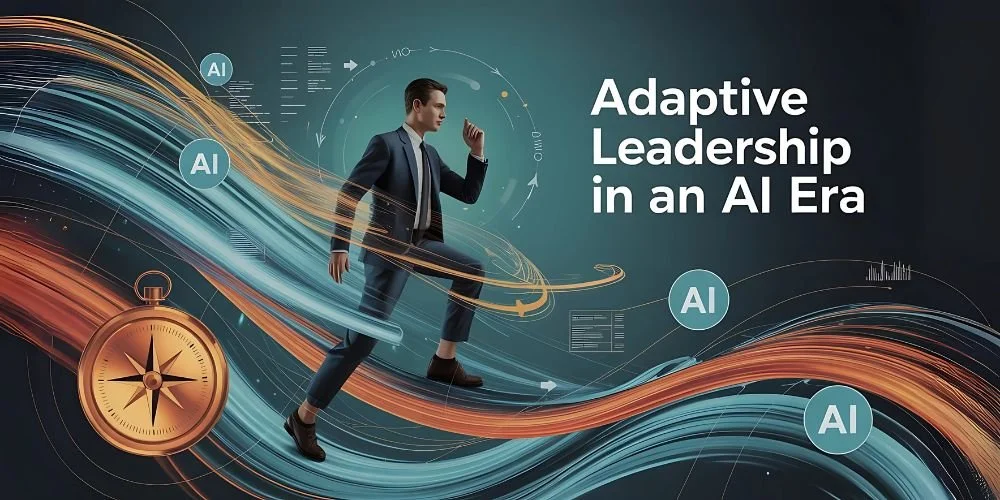Mastering Adaptive Leadership in an AI Era
Adaptability has always been a valuable leadership trait. But now, in this AI-driven world, it’s non-negotiable. In Episode 72 of Talent Talk, I had a deeply insightful conversation with Armanda Mealha of Microsoft Portugal. We explored what it really means to lead through complexity—and how leaders can stay grounded, flexible, and forward-looking in the face of rapid technological change.
🎧 Listen to the full episode on Spotify:Talent Talk – Episode 72
What Adaptive Leadership Means to Me
For me, adaptive leadership is about staying curious while holding your ground. It’s about creating clarity—not by having all the answers, but by being willing to lead through uncertainty. Armanda and I agreed: the most effective leaders today are those who listen deeply, adjust quickly, and aren’t afraid to rethink how things are done.
“You don’t need to have all the answers—you need to be willing to ask better questions.”
That’s one of my favourite reflections from this episode.
5 Traits I See in Truly Adaptive Leaders
Over the years, I’ve worked with leaders across industries. The ones who thrive in today’s pace of change consistently show these five traits:
1. Humility
They lead with a learner’s mindset. They’re not trying to prove they’re the smartest in the room—they’re inviting others to think with them.
2. Curiosity
They don’t panic when things shift. They pause and ask: What can I learn here? What’s possible?
3. Emotional Intelligence
They’re tuned into the pulse of their teams. They notice fear, fatigue, resistance—and they address it with empathy, not pressure.
4. Experimentation
They prototype. Test. Reflect. Improve. At Microsoft, Armanda’s team pilots tools like Copilot in low-risk ways, then scales based on feedback. I encourage clients to do the same.
5. Transparent Communication
They bring people along for the ride. They share context, ask for input, and build ownership—not just compliance.
Adaptive Leadership in the Real World
Here are some examples we touched on that really brought these ideas to life:
At Microsoft, teams piloted AI tools across departments, then openly shared what worked and what didn’t. That transparency created buy-in.
In HR, one company used AI to streamline onboarding, but when concerns arose, leadership paused, listened, and reworked the rollout collaboratively.
In education, schools introduced AI to students and paired it with discussions on ethics and creativity—turning tech into a learning opportunity, not a threat.
This kind of leadership isn’t reactive—it’s strategic, human, and grounded.
Want to Build This in Your Team?
If you’re leading a team, here’s where I’d start:
Build reflection into your routine: Ask, “What did we try? What did we learn?” regularly.
Celebrate agility: Recognize the people who try, adapt, and improve.
Support micro-experiments: Encourage people to test ideas on a small scale before launching big.
Foster psychological safety: Let people say “I don’t know” without fear.
Model it yourself: Share your learning journey openly—what’s working, what isn’t, what surprised you.
When leaders evolve out loud, others feel permission to do the same.
What Gets in the Way?
Adaptive leadership sounds great—but in practice, it’s not always easy. Here are some of the common blockers I help clients work through:
Fear of failure: Too many teams are afraid to make mistakes. You need to shift the culture to one of learning over perfection.
Rigid systems: If your structures can’t flex, your people won’t either. Revisit outdated processes and see what needs to be reimagined.
Command-and-control thinking: Today’s challenges can’t be solved from the top down. Invite more voices into decisions.
“We need to be open to being changed by what we learn,” Armanda said.
That one sentence sums up the heart of adaptive leadership.
Final Thoughts
In the AI era, the best leaders aren’t the ones who move the fastest or shout the loudest. They’re the ones who stay open, who bring others along, and who lead through learning.
I believe adaptability is the bridge between uncertainty and progress. And the good news? It’s a skill. One you can grow—with intention, courage, and a little bit of reflection.
Want to Dig Deeper?
This blog is part of my 5-part series based on Talent Talk Episode 72 with Armanda Mealha.
🎧 Listen to the full episode on Spotify to hear how real leaders are evolving in real time.
📣 If your leadership team needs support in developing adaptability, mindset resilience, or navigating AI with confidence—visit The Career Establishment. I’d love to work with you.

